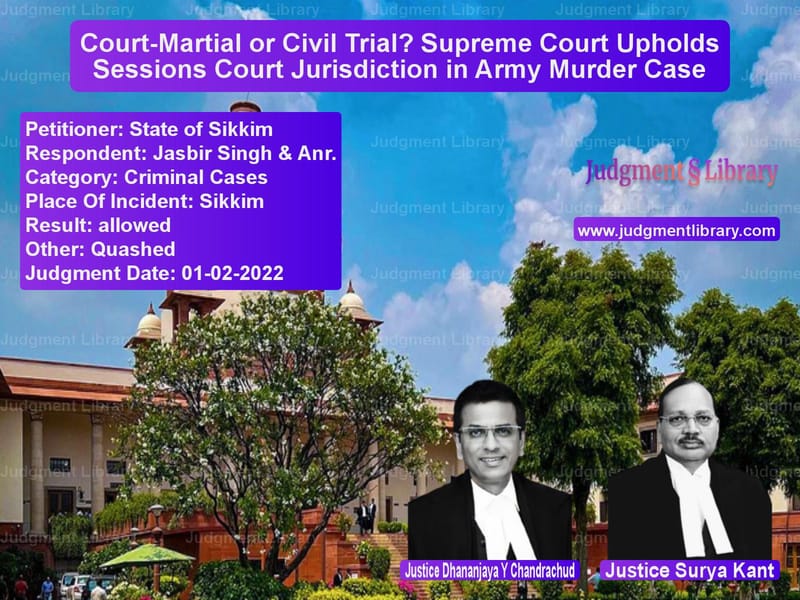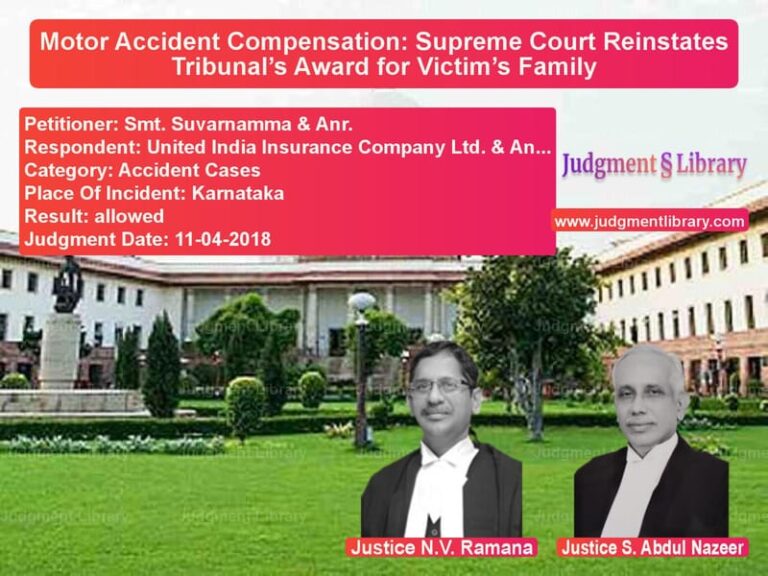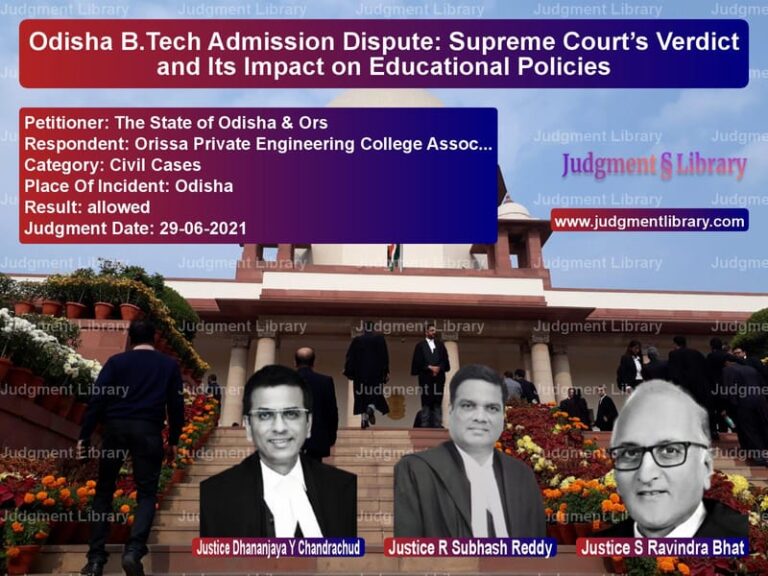Court-Martial or Civil Trial? Supreme Court Upholds Sessions Court Jurisdiction in Army Murder Case
The Supreme Court, in its judgment dated February 1, 2022, ruled that the Sessions Court had jurisdiction to try Lance Naik Jasbir Singh for charges under Section 302 IPC (Murder) and Section 25(1B)(a) of the Arms Act. The Court set aside the decision of the Sikkim High Court, which had directed that the accused be tried only by a court-martial under the Army Act, 1950.
Background of the Case
The case arose from an incident on December 14, 2014, at the 17 Mountain Division of the Indian Army in Gangtok, Sikkim. Lance Naik Rajesh Kumar, an eyewitness, reported that around 6:30 PM, he heard gunshots in the barracks. Rushing inside, he saw Lance Naik Jasbir Singh firing an INSAS rifle at fellow soldier Rifleman Balbir Singh. After being restrained, Jasbir Singh escaped momentarily but was later apprehended.
The police registered FIR No. 409/2014 at Sadar Police Station, Gangtok, and initiated an investigation.
Legal Proceedings
- December 15, 2014: The Army handed over Jasbir Singh to the police.
- February 13, 2015: The police filed a charge sheet for murder and illegal possession of a firearm.
- July 15, 2015: The Sessions Judge framed charges under Section 302 IPC and the Arms Act.
- March 9, 2017: The Sessions Judge ruled that Jasbir Singh should be tried by a court-martial and directed his transfer to Army custody.
- April 6, 2019: The Sikkim High Court upheld this decision, leading the State of Sikkim to file an appeal before the Supreme Court.
Arguments Presented
Petitioner’s (State of Sikkim) Arguments
The State of Sikkim, represented by Advocate General Vivek Kohli, contended:
- The Army had exercised discretion to allow trial in a civil court under Section 125 of the Army Act.
- The Army cooperated fully in the investigation, handed over the accused, and provided all necessary documents.
- Since the trial was already in its final stages, transferring the accused back to military custody would unnecessarily delay justice.
Respondent’s (Jasbir Singh) Arguments
Jasbir Singh’s counsel argued:
- Under Sections 69 and 70 of the Army Act, military personnel should be tried by a court-martial for offenses committed while on duty.
- The Sessions Judge failed to issue a notice under Rule 4 of the Criminal Courts and Court-Martial (Adjustment of Jurisdiction) Rules, 1978, making the trial void.
- Since the accused had retired from service on March 31, 2020, the Army could still conduct a trial under its extended jurisdiction.
Supreme Court’s Observations
On Jurisdiction of Civil Courts vs. Court-Martial
The Court ruled that both civil courts and court-martial have concurrent jurisdiction over the case:
“Where there exists concurrent jurisdiction in the court-martial and in the ordinary criminal court, the discretion of conducting the court-martial in preference to a trial by the ordinary criminal court is entrusted to the designated officer under Section 125.”
On the Discretion of the Army
The Court found that the Army had already exercised its discretion to allow trial by a civil court:
“The entire sequence of events, including the handing over of the accused and cooperation in the trial, proves that the Commanding Officer had opted for civil court jurisdiction.”
On the Failure to Issue Notice Under Rule 4
The Court rejected the argument that non-issuance of notice under Rule 4 of the 1978 Rules invalidated the trial:
“When the competent military authorities, knowing full well the nature of the offense, handed the accused over to the civil authorities, the Magistrate was justified in proceeding.”
Final Judgment
The Supreme Court ruled:
- The Sikkim High Court’s order was quashed.
- The Sessions Court had jurisdiction and must proceed with the trial.
- Jasbir Singh must be transferred from military custody to civil custody for trial.
Implications of the Judgment
This judgment has significant implications:
- Jurisdictional Clarity: It confirms that in cases of concurrent jurisdiction, the Army’s discretion is crucial in determining whether a case proceeds in a civil court or a court-martial.
- Judicial Discipline: High Courts cannot override a Sessions Court’s jurisdiction once the Army has chosen civil trial.
- Timely Justice: It prevents unnecessary procedural delays in serious offenses like murder.
The Supreme Court’s verdict ensures that military personnel accused of serious crimes can be tried fairly while maintaining judicial integrity.
Petitioner Name: State of Sikkim.Respondent Name: Jasbir Singh & Anr..Judgment By: Justice Dhananjaya Y Chandrachud, Justice Surya Kant.Place Of Incident: Sikkim.Judgment Date: 01-02-2022.
Don’t miss out on the full details! Download the complete judgment in PDF format below and gain valuable insights instantly!
Download Judgment: state-of-sikkim-vs-jasbir-singh-&-anr.-supreme-court-of-india-judgment-dated-01-02-2022.pdf
Directly Download Judgment: Directly download this Judgment
See all petitions in Murder Cases
See all petitions in Bail and Anticipatory Bail
See all petitions in Custodial Deaths and Police Misconduct
See all petitions in Judgment by Dhananjaya Y Chandrachud
See all petitions in Judgment by Surya Kant
See all petitions in allowed
See all petitions in Quashed
See all petitions in supreme court of India judgments February 2022
See all petitions in 2022 judgments
See all posts in Criminal Cases Category
See all allowed petitions in Criminal Cases Category
See all Dismissed petitions in Criminal Cases Category
See all partially allowed petitions in Criminal Cases Category







